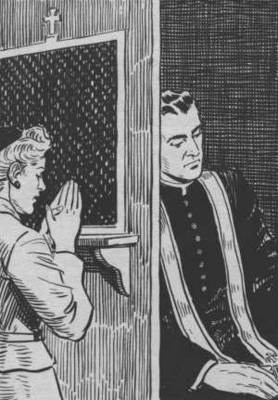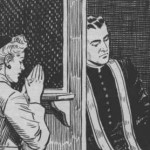
A
MOTHER’S PLIGHT:
AN ESSAY on CONFESSION
by Paul Baumann, Editor, Commonweal Magazine
© 2012 Commonweal - January 13,
2012
My
mother, Carol Marie Linehan, was not a pious woman.
She did, of course, instruct us in how to say
our prayers, but otherwise I can’t remember
her ever uttering the name “Jesus”
or mentioning a pope let alone a bishop. Bob Hope
and Bing Crosby seemed to comprise the entirety
of her pantheon of Catholic saints, and TV’s
The Wonderful World of Walt Disney was as close
to religious programming as our family got. Her
favorite biblical passage was “God helps
those who help themselves,” a proverb I
have not been able to find in Scripture.
Although
my mother’s father was a lawyer, and had
been education at Boston College High School and
College, he chose not to send her to college,
and her own religious education, as best I could
tell, was derived sketchily from the Baltimore
Catechism. Nevertheless, she had a firmly fixed
view of the moral universe. No premarital sex,
no extramarital sex, and no divorce were the fundamental
articles o her faith and on two or three occasions
she explicated with startling crudeness the moral
reasoning behind these prohibitions. (As I recall
it had something to do with cows and free film.)
Like many of her generation, she inherited a Catholicism
focused almost entirely on a deep belief in the
tribal virtues taught by competitive sports –
at least for boys – and rigid rules about
sexual behavior. For women of her generation,
a “bad reputation” could put you on
the marital sidelines, and out-of-wedlock pregnancy
spelled exile or worse.
My
mother put a great stock in marriage as the ultimate
vocation for a chaste Catholic girl, although
I can’t recall her ever using the word “chaste.”
My parents were3 married in November 1950, and
I was born nine months later. My brother Steve
– a push fellow from the start - followed
thirteen months after that. In the first ten years
of her marriage, our mother was pregnant seven
times - two miscarriages and five healthy births.
The deliveries were not always easy. She also
suffered from severe endometriosis, which caused
heavy and almost constant bleeding and considerable
pain. These things were not talked about in our
family. I remember one bewildering night in my
early teens when she collapsed - from a ruptured
ovarian cyst, I now assume -_and my father raced
out of the house to the hospital with her in his
arms. No exaltations were offered, and no one
dared to ask. The week I graduated from college,
she collapsed again and underwent an emergency
radical hysterectomy.
This
is an all-too-familiar story for Catholic women
of a certain age, and I think it should be better
known , especially among younger, more fervent
Catholics who idealism - and naivete - is pandered
to by the current emphasis on the Theology of
the body. In the 1960's, after her fifth child
was born, my mother’s doctor insisted she
go on the Pill to help regulate her menstrual
cycles. Dutifully she consulted our parish priest,
and was told in no uncertain terms that recourse
to the Pill was forbidden under any circumstance.
She complied with the priest’s instructions,
or so I have been told, until she suffered yet
another hemorrhage.
Eventually, after several incidents like the one
described above, she did go on the Pill, and doing
so presumably helped alleviate her symptoms, at
least for a time. Of course, my mother never talked
to me or my brothers about any of this, though
in later years she was more forthcoming with our
sisters. I do remember her complaining bitterly,
in the proud way the Irish do, about women on
the Pill who still presented themselves a the
Communion rail.
In time my mother stopped going to Mass altogether;
during the last thirty-five years of her life,
she attended church only for baptisms, weddings,
and funerals. She seemed to think that when it
came to the church, you were either all in or
all out. That was what she had been taught, after
all.
I
doubt that her personal conflict over the Pill
was the only reason my mother stopped going to
church, but it surely was the catalyst. Years
later I am left to wonder, did she leave the church,
or did the church in effect leave her, turning
a blind eye, in its customary way, to “women’s
complaints”? Either way, it seemed–and
seems to me still–a harsh exile for a woman
who had risked her body, and on occasion her life,
in obedience to the church’s dubious teachings
concerning the supposedly self-evident teleology
of every sexual act.
Despite the reasoned and patient objections of
countless theologians and the largely silent defection
of the majority of the faithful, the church continues
to cling to these teachings, and does so with
the fierce desperation of those who are wrong
and can’t or won’t admit it.
Yet, as philosopher Michael Dummert wrote [in
Commonweal magazine, “Indefensible”,
February 11, 2011)], the unpersuasiveness of the
current teaching undermines the church’s
moral authority in senseless ways. In this pettifogging
about sexuality really what the gospel demands
of us? In the meantime... thousands are deprived
of the sacramental nourishment only the church
can provide.
Catholicism
has altered seemingly irreformable teachings on
more than a few occasions over the centuries (baptizing
the uncircumcised, the perfidy of the Jews, slaver,
usury, separation of church and state) yet somehow
found a way forward with it identity, focus, and
integrity intact; and I hope now will muster the
will to find a out of this particular dead end.
As my mother, bless her, would say: “God
helps those who help themselves.”


Addendum
- from a book of advice
for seminarians, 1897:
A
dangerous rock which the priest encounters in
the stormy sea of the world is the hearing of
women’s confessions. The knowledge of this
fact and a sense of dread are his best safeguard.
He must persevere in a state of indifference and
insensibility towards female penitents; he must
keep his heart hermetically sealed against human
sentiments of affection and avoid every sign of
familiarity, though cherishing a holy respect
and reverence for the sex of our mothers.
Woman
needs the sacraments more frequently than man.
Her good influence in the home-circle is of the
highest value for the faith and morality of those
who come in daily contact with her. Her presence
should spread about her the perfume of Christian
devotion and charity. It is the duty of a confessor
to cultivate the virtues of humility and purity
in the queenly heart of the Catholic woman and
to fit her for the exalted position which Mary,
the Mother of Jesus, won for her in the Church
of her Son.
Guard
your eyes: Averte oculos tuos, ne videant
canitatem. The eyes are the windows of the
soul; close them to keep sensuality aloof. Do
not look at a female penitent either before, during,
or after confession. It would he injurious to
you and others for several reasons. Non permittas
illas ante confessionale accedere, ut tibi loquantur,
et multo minus, ut manus deosculentur. In actu
confessionis non ostendat, se eas agnoscere(St.
Alph.). Guard your tongue; never use expressions
of friendship and familiarity; put the fewest
possible questions.
With
young women observe the advice of St. Augustine:
Sermo brevis et rigidus cum his mulieribus
habendus est; nec tamen quia sanctiores, ideo
minus cavendae; quo enim sanctiores sunt, eo magis
alliciant. St. Liguori says: Cum junioribus
in confessionariosis potius rigidus quam suavis.
Speak to a woman in the confessional as if you
were addressing her spirit, separated from the
body and standing before the judgment-seat of
God. Be kind and respectful to old women, especially
if they are afflicted with deafness or some infirmity
peculiar to their age. Obsecra anus ut matres(1
Tim. v. 2).

Image
Ownership Credits
Next
Prayer
Prayer Index
Website
Home
Contact
- Comment - Question? - dbm@nowstar.net